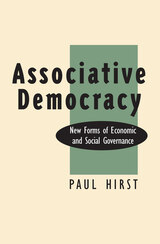
Not simply a utopian idea, associative democracy calls for new forms of economic and social governance as supplements to representative democracy and market economies. It addresses the problems of the overload of big government by democratizing and empowering civil society. It transfers social provision to self-governing voluntary associations, while retaining public funding and political accountability. In the economic sphere, it advocates regional economic regulation through public-private partnerships, the promotion of self-governing industrial districts, and the democratization of the company.


A visitor to Beijing in 1900, Chinese or foreign, would have been struck by the great number of native-place lodges serving the needs of scholars and officials from the provinces. What were these native-place lodges? How did they develop over time? How did they fit into and shape Beijing's urban ecology? How did they further native-place ties?
In answering these questions, the author considers how native-place ties functioned as channels of communication between China's provinces and the political center; how sojourners to the capital used native-place ties to create solidarity within their communities of fellow provincials and within the class of scholar-officials as a whole; how the state co-opted these ties as a means of maintaining order within the city and controlling the imperial bureaucracy; how native-place ties transformed the urban landscape and social structure of the city; and how these functions were refashioned in the decades of political innovation that closed the Qing period. Native-place lodges are often cited as an example of the particularistic ties that characterized traditional China and worked against the emergence of a modern state based on loyalty to the nation. The author argues that by fostering awareness of membership in an elite group, the native-place lodges generated a sense of belonging to a nation that furthered the reforms undertaken in the early twentieth century.
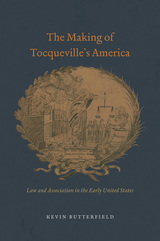
Butterfield explains that the first generations of American citizens found in the concept of membership—in churches, fraternities, reform societies, labor unions, and private business corporations—a mechanism to balance the tension between collective action and personal autonomy, something they accomplished by emphasizing law and procedural fairness. As this post-Revolutionary procedural culture developed, so too did the legal substructure of American civil society. Tocqueville, then, was wrong to see associations as the training ground for democracy, where people learned to honor one another’s voices and perspectives. Rather, they were the training ground for something no less valuable to the success of the American democratic experiment: increasingly formal and legalistic relations among people.
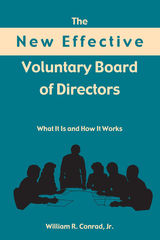
More than one million nonprofit or voluntary organizations have been incorporated in the United States, and there are countless others throughout the world. Although they range in size and purpose from small social clubs to large and complex organizations such as universities and hospitals, they all have one thing in common: a board of directors of some type. What these boards do varies as much as the organizations themselves.
The New Effective Voluntary Board of Directors provides clear answers, illustrated with graphics, to previously ambiguous and bewildering questions, such as definitions of policy, the function of boards, the role of board members, and many other issues.
Dealing with the delicate balance in nonprofit organizations, the legal implications of serving on a board, the nonprofit leadership and management model, and other matters of concern, William Conrad applies his lifelong experience to providing a comprehensive, practical, and concise tool for those involved in the unique challenges associated with the leadership and management of nonprofit and voluntary groups.
With nearly 30,000 copies of earlier editions of this work in print, Swallow Press is pleased to publish the new, updated, and revised edition of this classic in its field.

E pluribus unum no longer holds. Out of the many have come as many claims and grievances, all at war with the idea of one nation undivided. The damage thus done to our national life, as too few Americans seek a common good, is Martin Marty's concern. His book is an urgent call for repair and a personal testament toward resolution.
A world-renowned authority on religion and ethics in America, Marty gives a judicious account (itself a rarity and a relief in our day of uncivil discourse) of how the body politic has been torn between the imperative of one people, one voice, and the separate urgings of distinct identities--racial, ethnic, religious, gendered, ideological, economic. Foreseeing an utter deadlock in public life, with devastating consequences, if this continues, he envisions steps we might take to carry America past the new turbulence.
While the grand story of oneness eludes us (and probably always will), Marty reminds us that we do have a rich, ever-growing, and ever more inclusive repertory of myths, symbols, histories, and, most of all, stories on which to draw. He pictures these stories, with their diverse interpretations, as part of a conversation that crosses the boundaries of groups. Where argument polarizes and deafens, conversation is open ended, guided by questions, allowing for inventiveness, fair play, and dignity for all. It serves as a medium in Marty's broader vision, which replaces the restrictive, difficult, and perhaps unattainable ideal of "community" with the looser, more workable idea of "association."
An "association of associations" is what Marty contemplates, and for the spirit and will to promote it he looks to eighteenth-century motifs of sentiment and affection, convergences of intellect and emotion that develop from shared experience. And as this book so eloquently reminds us, America, however diverse, is an experience we all share.
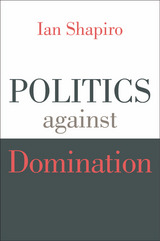
Ian Shapiro makes a compelling case that the overriding purpose of politics should be to combat domination. Moreover, he shows how to put resistance to domination into practice at home and abroad. This is a major work of applied political theory, a profound challenge to utopian visions, and a guide to fundamental problems of justice and distribution.
“Shapiro’s insights are trenchant, especially with regards to the Citizens United decision, and his counsel on how the ‘status-quo bias’ in national political institutions favors the privileged. After more than a decade of imperial overreach, his restrained account of foreign policy should likewise find support.”
—Scott A. Lucas, Los Angeles Review of Books
“Shapiro has a brief and compelling section on the importance of hope in his first chapter. This book enacts and encourages hope, with its analytical clarity, deep engagement of complicated political issues that resist easy theorizing, and emphasis on the politically possible.”
—Kathleen Tipler, Political Science Quarterly
“Offers important insights for thinking about democracy’s prospects.”
—Christopher Hobson, Perspectives on Politics

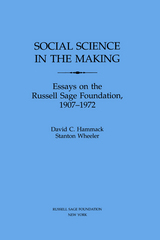
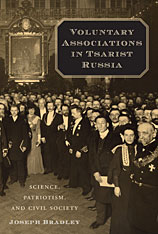
On the eve of World War I, Russia, not known as a nation of joiners, had thousands of voluntary associations. Joseph Bradley examines the crucial role of voluntary associations in the development of civil society in Russia from the late eighteenth to the early twentieth century.
Russians populated a growing public sphere with societies based on the model of the European enlightenment. Owing to the mission of such learned associations as the Free Economic Society, the Moscow Agricultural Society, and the Russian Geographical Society, civil society became inextricably linked to patriotism and the dissemination of scientific knowledge. Although civil society and the autocratic state are often described as bitter rivals, cooperation in the project of national prestige and prosperity was more often the rule. However, an increasing public assertiveness challenged autocratic authority, and associations became a focal point of a contradictory political culture: they fostered a state-society partnership but at the same time were a critical element in the effort to emancipate society from autocracy and arbitrary officialdom.

READERS
Browse our collection.
PUBLISHERS
See BiblioVault's publisher services.
STUDENT SERVICES
Files for college accessibility offices.
UChicago Accessibility Resources
home | accessibility | search | about | contact us
BiblioVault ® 2001 - 2025
The University of Chicago Press









